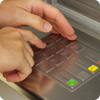
Smart online usage means taking steps to avoid falling victim to online fraud. Online fraud occurs when criminals try to obtain your personal information, such as credit card and account numbers, get you to pay for items that are either non-existent or misrepresented to you and/or steal your identity.
Fraudsters use a variety of techniques. They may
- Present themselves as valid merchants enticing you to pay for something that you’ll never receive
- Send out official-looking emails attempting to convince you to divulge personal information such as account numbers, usernames, passwords, PINs and credit card details
- Gain access to your computer and personal information via a virus
- Contact you by telephone or email, representing themselves as someone with whom you have a business relationship, and direct you to call an unverifiable telephone number or proceed to a (fraudulent) website to provide them with your personal information
Here’s what you need to know to protect yourself:
 |
|
Email safety. Don’t reply to authentic-looking emails that attempt to get you to release personal and financial information. Email is not secure. TD Bank Group will ask you to call us at a verifiable telephone number for such a discussion.
|
|
 |
|
Passwords & login pages. Guard your usernames, passwords and login information – they’re the keys that let you in to your accounts. TD Bank Group will not ask you to provide personal information, or login information such as usernames, passwords, PINs, IdentificationPlus security questions and answers, or account numbers, through unsolicited email.
|
|
 |
|
Buying online. Shop and browse online with confidence by learning to recognize Internet fraud and taking a few simple precautions to protect yourself and your money.
|
|